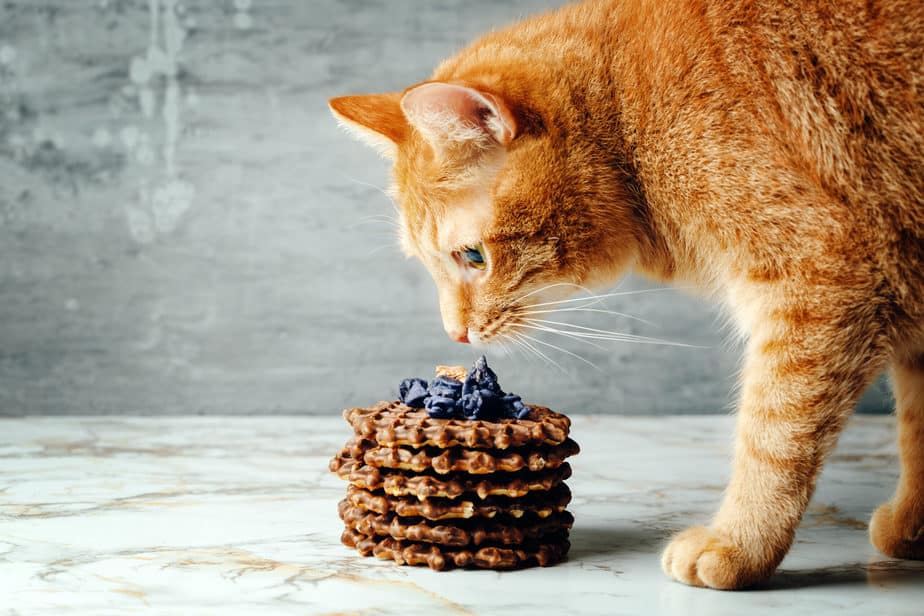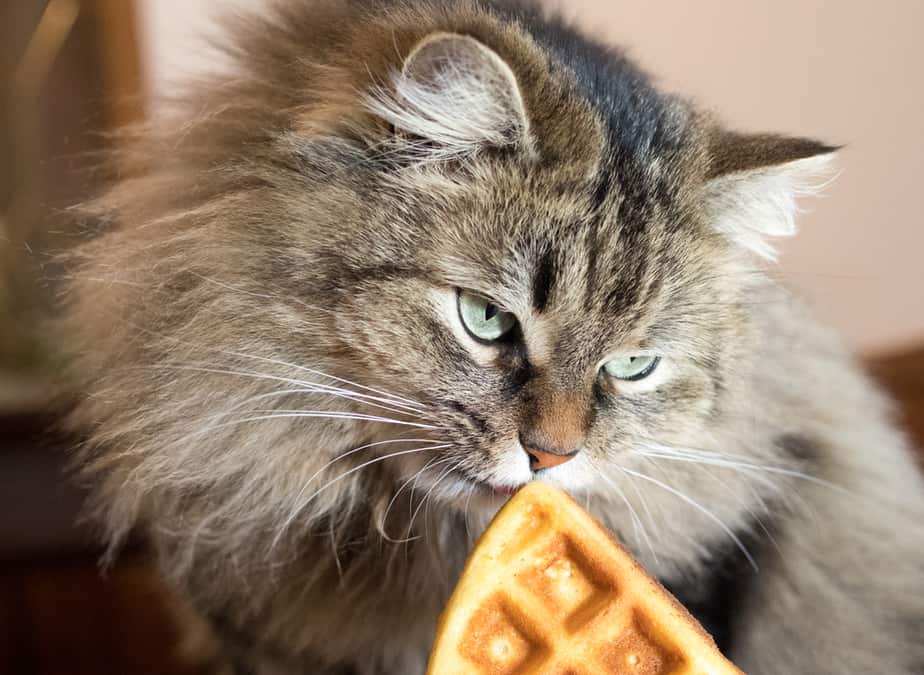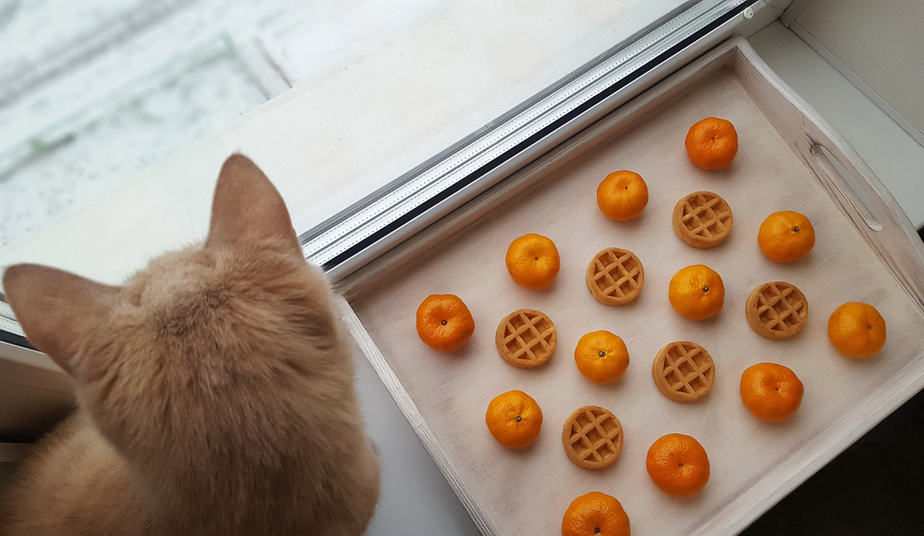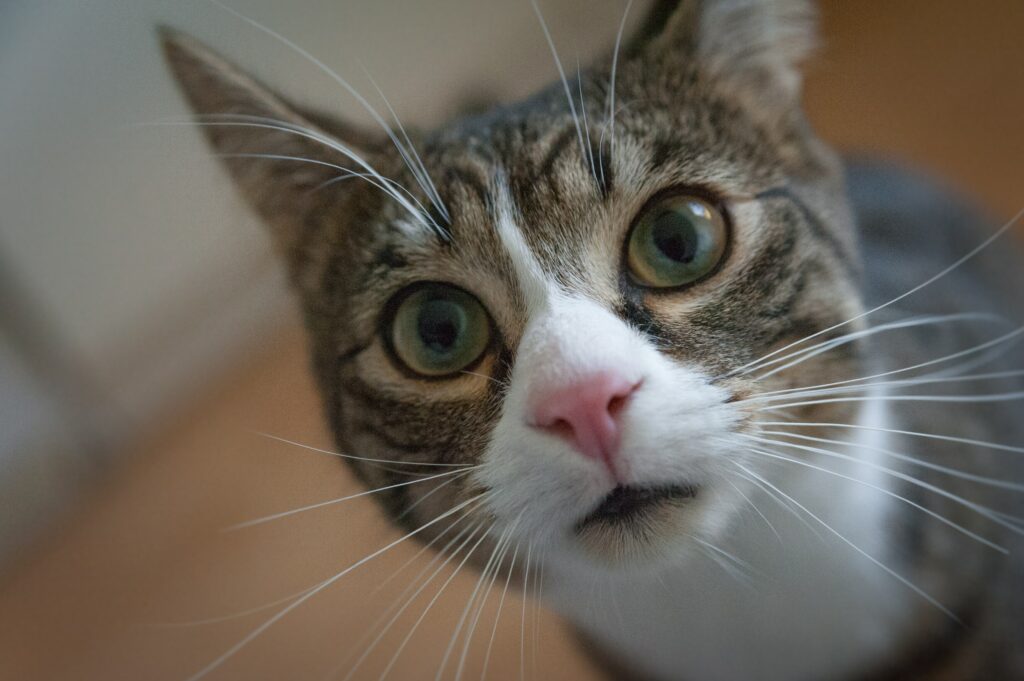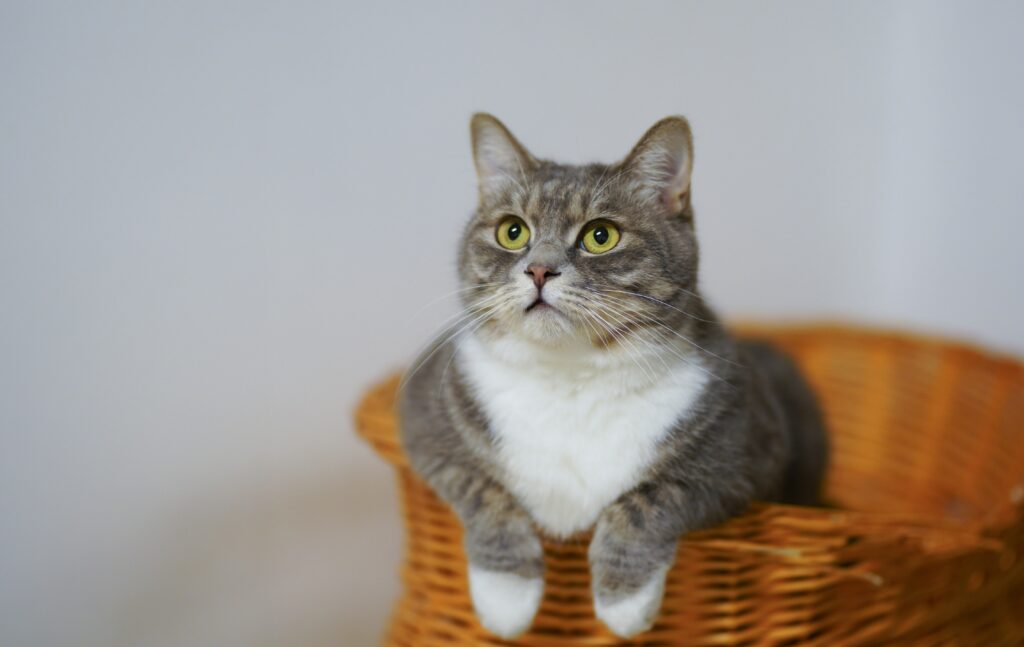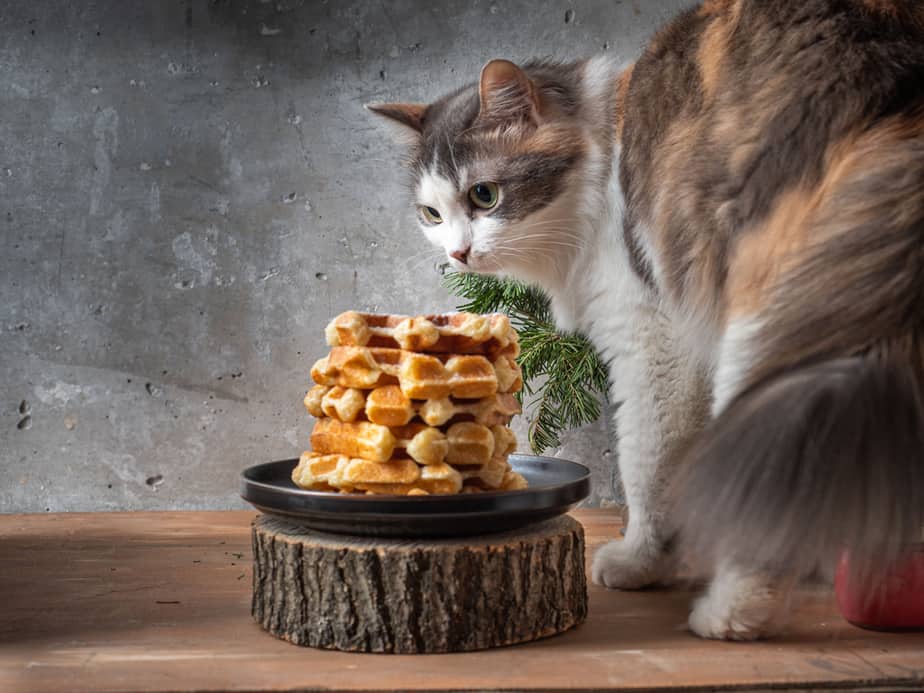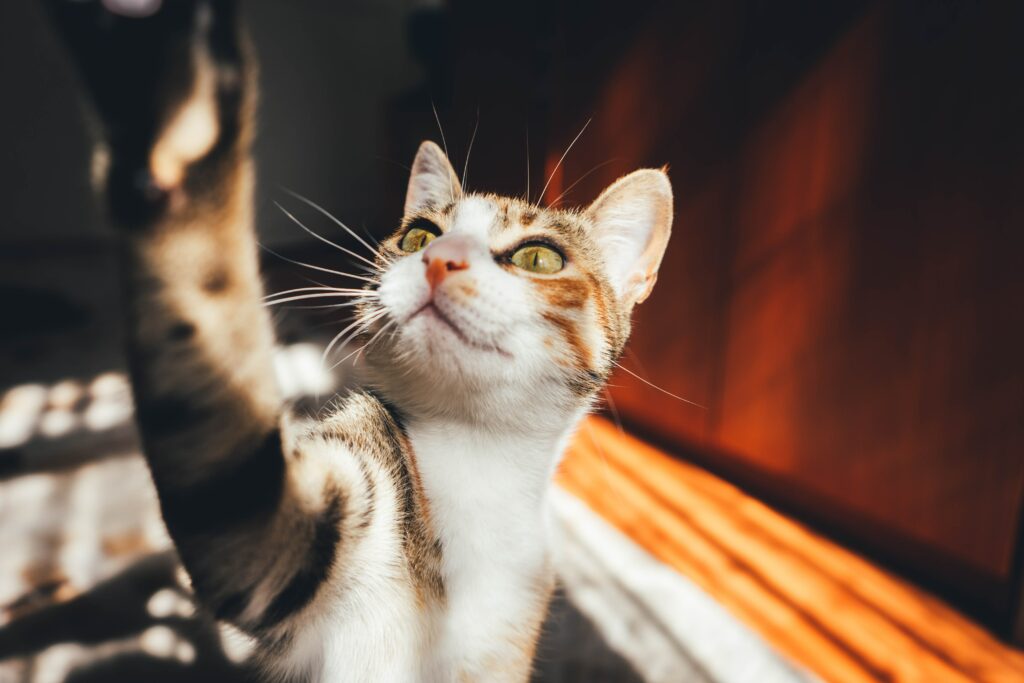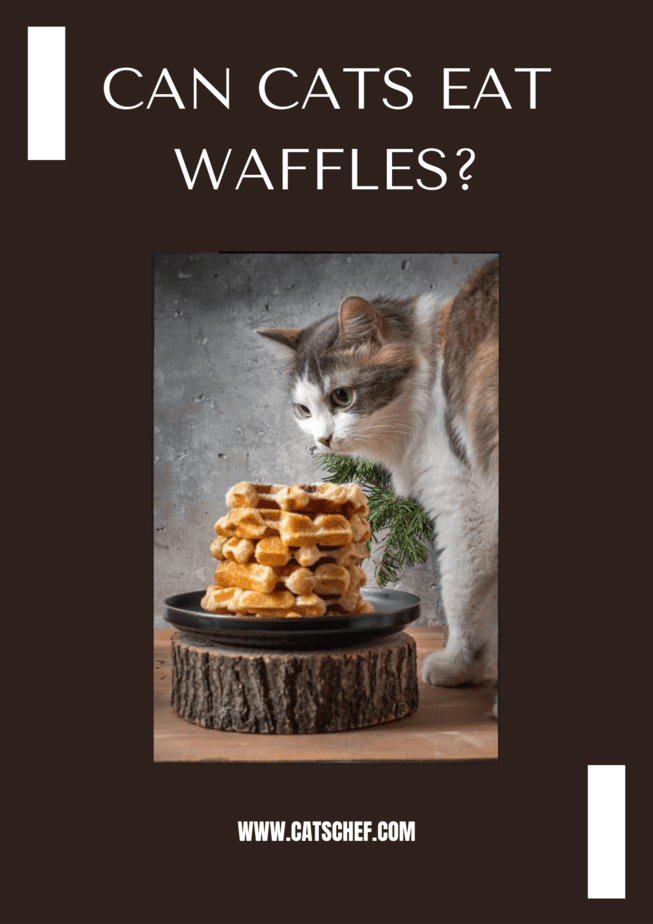📖 Table of Content:
That constant meowing and begging can be annoying, but how can you resist that cute face? We know it isn’t the smartest idea to share food with our pets, but it’s hard not to. However, can cats eat waffles?
This is a common breakfast pastry found in stores and cafes all around. Endless customization options and the sweet taste, are what makes this treat purrfect. Not just that, this food is quick to prepare and the required ingredients are among the most common ones in your fridge.
The combinations you can make with this pastry are mind-blowing. Next to fillings, you can add dried or fresh fruit, various toppings, and spices that will make your mouth water. If you don’t feel like mixing all the ingredients, you can find them in your nearby store.
The question is, with easy access to these delicacies all around our kitchen, can cats eat waffles? Should you be on the lookout for any possible thefts? The suspect is quiet, but it’s those powdered sugar paw-prints that give your pet away.
Are waffles safe for cats?
If you’re looking for some treats to give to your feline, waffles aren’t the best choice. These pastries aren’t poisonous to felines, which is good news, especially if she’s one of the thieves.
Waffles are something people enjoy eating, but this doesn’t have to be the case with our furkids. Cat food brands offer us a wide range of cat treats made specifically for their dietary needs.
There’s no need in feeding your feline waffles if that’s what you’re asking. It’s quite simple – if it doesn’t meet her dietary requirements, it’s essentially useless. Therefore, you should skip the waffles and go pick up some pet treats.
Dried fish, like anchovies, would be a great substitute for waffles or any kind of human food. Although a few bites of this pastry from time to time aren’t likely to hurt your feline, it’s best to stay away from non-cat foods.
Why do cats like waffles?
You may think the reasons your fluff is trying to steal some of the waffles off of your plate are sweet fillings and sugar. However, you’re wrong. This is the reason YOU like these treats, and of course, because they’re easy to prepare.
There are a few reasons your pet may be curious about waffles. First of all, they’re cats. You knew this already, but our pets are curious creatures by nature. This means they will put their noses in anyone’s business if they are intrigued by it.
Besides, waffles are filled with certain nutrients that attract your furry friend. For example, high amounts of fat contained in this food will entice your furball, as well as the high-calorie content. As you can conclude, no sugar or sweet fillings are really the main targets of your cat.
Cats don’t have a sweet tooth
This might come as shocking news because you probably caught your pet stealing some treats from you. You were warned before that felines can’t eat sweets, right? Did you know cats can eat waffles, but can’t taste the sugar?
Cats are unable to detect the sweet flavor, because they lack specific taste buds. This is due to the fact that they are carnivores, which means they have taste buds that detect protein and fat.
As a result, we can conclude that sugar isn’t required in their diet. When it comes to waffles, we’re talking about high sugar content that’s unhealthy for felines.
What are these pastries made of?
One of the good things about these treats is that they serve as an amazing breakfast for humans. Especially if you’re in a rush in the morning, you just have to whisk some of these ingredients together and pour the batter onto the waffle-maker.
Ingredients required for this quick and easy breakfast (or brunch, we don’t judge!) are the common ones found in every household. Eggs, sugar, milk, butter, flour, and some vanilla extract are enough to make this mouth-watering delicacy!
When you think of these ingredients, you’d never think of them as harmful. However, some of these may better be kept out of your cat’s reach!
Eggs and milk
If you ever ate some boiled eggs and noticed your cat sneaking around them, don’t panic! Eggs are a perfectly good source of protein for your feline friend. This food could be a great occasional snack for her.
Felines require protein that’s derived from animals, and eggs fall under that category. Therefore, they make a great addition to your cat’s diet. Avoid feeding her raw or scrambled eggs. Raw eggs can be disease carriers and could transfer certain bacteria and germs.
The consequences are detrimental to your feline’s health as she could potentially become infected by Salmonella or E. coli. Make sure you feed her boiled, unseasoned eggs, only in moderation.
When it comes to dairy products like milk, people are often misled into thinking that it’s one of cats’ main foods. However, this isn’t the case. You should know that cats drinking milk is nothing but a myth.
Some felines like milk, but it’s not because of dairy. If you see a cat lapping up some of it, it’s because it contains large amounts of fat. While fat is toothsome, dairy can have the opposite effect on your pet.
Cats are lactose intolerant because they lack an enzyme called lactase that helps break down the sugars found in milk. Their intestines can’t produce enough lactase which results in gastric distress when milk is ingested.
If she’s had some of the milk or dairy products, you may notice her running to her litter box. Other symptoms of lactose intolerance include vomiting, bloating, and gas.
What about butter?
Butter can have a similar effect on felines as it contains dairy as well. It’s higher in fat and oils, so it isn’t a healthier option than milk, although it may be more appealing to your feline friend. Moreover, it can have more adverse effects than milk because of the number of saturated fats.
There are some healthier options for butter, such as almond butter that doesn’t contain dairy. Keep in mind whatever the kind, butter is always a potential risk to your pet’s health!
Can cats eat waffles because of certain condiments?
Spices and seasoning are an inevitable part of our daily food intake. These just make our lives richer and our food more flavorful. When it comes to our four-legged companions, the same can’t be applied.
Cats have a pretty simple diet which mostly consists of protein and some other nutrients. Table condiments like salt and sugar found in waffles are totally unnecessary in their diet.
These can lead to health issues if consumed in excessive amounts and on a regular basis. Small amounts of spice and sugar found in waffles can’t hurt your cat immediately. But, if she has access to these regularly, it could make matters worse.
Sugar
Sugar is a carbohydrate that’s unnecessary in a cat’s body. Over-consumption of these nutrients can lead to poor digestion and result in a few extra pounds. Your fluffball doesn’t need the extra chunk unless she’s underweight.
A series of health conditions might occur if you don’t cut down your cat’s sugar intake. The consumption of this ingredient is linked to obesity, tooth decay, as well as diabetes.
Salt content
Waffles contain a small amount of salt, despite their sweet taste,. This shouldn’t be a problem, but salt intake shouldn’t be a regular thing for your feline.
It can cause dehydration, so if you see your cat excessively drinking water or urinating, it could be a reason for concern. These symptoms are usually linked to sodium poisoning, which happens if your cat had an overabundance of salt.
Other signs of sodium toxicity could resemble those of gastrointestinal distress. These involve vomiting, diarrhea, and some cats may even experience fatigue and dizziness.
Is flour dangerous to cats?
It isn’t dangerous, but it’s also unnecessary. It’s made from grains and if you ever read the ingredients of your cat’s kibbles, you may have noticed a certain grain percentage. This is because they are fillers and are packed with fiber that helps your cat’s digestion.
Other than that, your feline shouldn’t consume flour in large amounts. She probably won’t ever be drawn to it, so don’t inspire her to test it out.
Vanilla extract
This is a common ingredient found in waffles and one of the reasons your cat should stay away from them. Vanilla extract is a flavorful component with a lovely aroma, and is commonly used in baked goods such as cakes, cupcakes, puddings, and waffles.
Waffles, like vanilla pudding, aren’t the ideal choice of food for cats because of this common ingredient.
The vanilla extract includes ethyl alcohol, which can cause alcohol toxicity in felines. At the end of the day, anything vanilla-flavored can be a threat to your cat’s health. So she better stray away.
Nutritional value of waffles
You might have guessed that these tasty baked goods don’t provide humans and cats with a high nutritional value. Because of all the sugar and fat, cats can eat waffles, but not without consequences.
If you’re leading a somewhat healthy life, you know you shouldn’t eat waffles all the time. However, cats don’t know this and that’s where you step in to make the right decisions for them!
High-fat content
Cats need certain amounts of fat. It’s an energy source that fuels their bodies and maintains a healthy balance in their systems. Still, if she exceeds her normal level of fat intake, your cat could face several health issues.
The fats found in waffles are unhealthy because they’re saturated fats. These are known to raise cholesterol levels in cats, as well as humans. If cholesterol levels continue rising, possible outcomes are higher risks of stroke and heart disease.
Can cats eat this calorie-dense food known as waffles?
If you’re looking for some quick source of calories to get you through the day, waffles are a great choice. You know what happens when you eat too many calories in one day, right?
The scale in your bathroom doesn’t lie and you can understand what she’s saying! The same goes for cats and their excessive calorie intake. If she exceeds her daily amount of calories, she will store them as fat.
This isn’t an ideal case scenario for her joints and overall health. The added pressure to her joints can increase the risk of developing arthritis in the future. Apart from this, digestive problems can also occur.
Can cats eat waffles with fillings and topping?
If you’re looking for a short answer to this question, it’s gonna be no. Cats shouldn’t eat any fillings and toppings because they’re mostly bad for them. Chocolate, vanilla, and other sweet additions are, if not poisonous, extremely harmful to their health.
If you want to offer your pet some waffles, make sure they’re plain and without extra powdered sugar on top. Some fruits can come into consideration like blueberries, cranberries, bananas, and even kiwi!
Otherwise, refrain from feeding your cat large portions of waffles; because even though cats can eat them, it is not recommended.
To sum up
It isn’t advisable to feed your furkid waffles. They’re high in sugar and other ingredients that can be detrimental to your cat’s health. Some ingredients can turn out to be poisonous to your pet, such as vanilla extract and chocolate.
Other compounds just aren’t suitable for their consumption. Dairy products like milk and butter should be avoided because felines are lactose intolerant. Apart from these, seasonings like sugar and salt can cause adverse effects in cats.
Make sure you don’t feed waffles to your pet on a daily basis. When you do, keep in mind they should be plain without any fillings or toppings. These are usually packed with sugar and other ingredients harmful to felines.
Feeding non-cat foods to your furball can lead to a series of health problems. High levels of carbs, fat, and calories are what make human food unsuitable for your pet.
